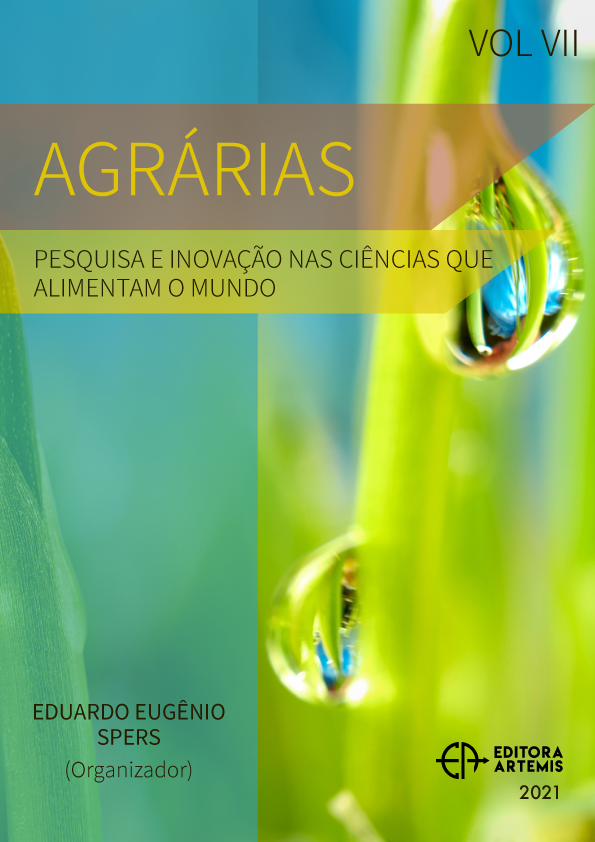
IDENTIFICATION AND INHERITANCE OF AN RDC GENE RESISTANCE TO SOYBEAN STEM CANKER (DIAPORTHE PHASEOLORUM VAR. CAULIVORA)
O cancro da haste da soja (CHS) é causado por duas variedades do fungo Diaporthe phaseolorum: var. meridionalis (Dpm) e var. caulivora (Dpc). O objetivo foi identificar e caracterizar o modo de herança dos genes Rdc por meio de uma análise Mendeliana clássica. Genótipos resistentes (R) e suscetíveis (S) foram usados para fazer 288 cruzamentos RxS e 132 RxR, incluindo seus recíprocos. As gerações F2 segregadas foram obtidas por autofecundação do respectivo F1. A incorporação de marcadores moleculares codominantes (Single Nucleotide Polymorphism, SNP) permitiu a validação molecular de 48,75% dos indivíduos heterozigotos F1. Pais (R e S), indivíduos F1 e famílias F2:3 (Teste de Progênie, TP) da população COD 1-258-2 foram inoculados com um isolado de Dpc (Dpc16), previamente identificado morfologicamente e molecularmente. O ensaio mostrou 21 famílias F2:3 categorizadas como R, 42 segregadas R e S e 11 como S. Particularmente, esta população F3 mostrou 466 indivíduos R e 274 S. O teste de qualidade de ajuste do qui-quadrado verificou que a segregação fenotípica para o indivíduo plantas em F3 ajustadas a uma proporção de 5:3 (R:S) e os resultados de TP corresponderam às razões genotípicas (1RR: 2Rr: 1rr) de indivíduos F2. Os resultados permitiram a identificação de um importante gene de resistência de herança simples de Mendel ao CHS, denominado Rdc1. Além disso, foi verificada segregação 9:3:3:1 independente entre este gene Rdc1 e o gene que regula a cor das flores, um marcador fenotípico típico da soja. Com base na revisão da literatura, este é o primeiro relato sobre genes de resistência (Rdc) identificados para CHS causada por Dpc.
IDENTIFICATION AND INHERITANCE OF AN RDC GENE RESISTANCE TO SOYBEAN STEM CANKER (DIAPORTHE PHASEOLORUM VAR. CAULIVORA)
-
DOI: 10.37572/EdArt_18122151413
-
Palavras-chave: Cancro da haste da soja, Diaporthe phaseolorum var. caulivora, SNP, teste de progênie, herança de Rdc1.
-
Keywords: Soybean stem canker, D phaseolorum var. caulivora, SNP
-
Abstract:
Soybean stem canker (SSC) is caused by two varieties of the fungus Diaporthe phaseolorum: var. meridionalis (Dpm) and var. caulivora (Dpc). The objective was to identify and characterize the mode of inheritance of Rdc genes through a classical Mendelian analysis. Resistant (R) and susceptible (S) genotypes were used to make 288 RxS and 132 RxR crosses, including their reciprocals. Segregating F2 generations were obtained by self-fertilization of the respective F1. The incorporation of codominant molecular markers (Single Nucleotide Polymorphism, SNP) allowed the molecular validation of 48.75% of F1 heterozygous individuals. Parents (R and S), F1 individuals, and F2:3 families (Progeny Test, PT) from COD 1–258-2 population were inoculated with an isolate of Dpc (Dpc16), previously identified morphologically and molecularly. The assay showed 21 F2:3 families categorized as R, 42 segregated R and S, and 11 as S. Particularly, this F3 population showed 466 individuals R and 274 S. The chi-square goodness of fit test verified that phenotypic segregation for individual plants in F3 adjusted to a 5:3 ratio (R:S) and the PT results corresponded to the genotypic ratios (1RR: 2Rr: 1rr) of F2 individuals. Results allowed the identification of a major resistance gene of simple Mendelian inheritance to SSC that was named Rdc1. Also, independent segregation 9:3:3:1 was verified between this Rdc1 gene and the gene that regulates flower colour, a typical phenotypic marker in soybean. Based on literature review, this is the first report on resistance genes (Rdc) identified for SSC caused by Dpc.
-
Número de páginas: 15
- Rosanna Nora Pioli
- Alejandra María Peruzzo
- Facundo Ezequiel Hernández
- Leonardo Daniel Ploper
- Guillermo Raúl Pratta

